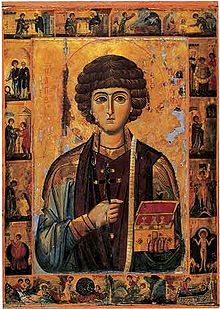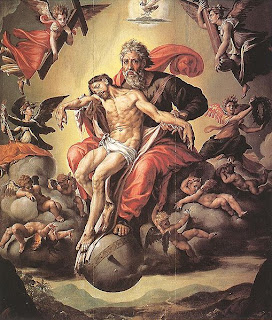Albino Luciani was born in 1912 in the small village of Forni di Canale (now known as Canale d'Agordo),situated between Venice and the Italian border with Austria.
He studied at the seminary of Belluno, was ordained in 1935, and was then sent to the Gregorian University in Rome where he took a degree in theology. After several years teaching theology at the Belluno seminary, Luciani was appointed Vicar General of Belluno in 1948, and ten years later Pope John XXIII, who thought very highly of him, named him Bishop of Vittorio Veneto. In 1969 he became Patriarch of Venice, and on 5th March 1973 Pope Paul VI made him a cardinal.
On the death of Pope Paul, Albino Luciani was elected Pope on 26 August 1978, taking the name John Paul in honour of his two immediate predecessors.
After only 33 days in office, Pope John Paul I died of a heart attack during the evening of 28 September 1978.
Pope John Paul I
The ‘Illustrissimi’ (the Letters) by Albino Luciani, were written between the years 1969 and 1978 when he was Patriarch of Venice, and were published in the Italian Christian paper ‘Il Messagero di Sant Antonio’. The letters are addressed to various individuals, some fictional, some historical. He writes to legendary figures, to important scientific, historical and literal people, to characters from their books, plays, operas, poems, to saints and even to Christ himself. If the recipients are varied, the subjects he discusses with them are even more so. Although addressed to many different characters, and related directly to their particular interests, the letters were meant for the ordinary person living in the 1970’s. They were written as a teaching device, as a means of proclaiming the gospel, of opening people’s minds and hearts anew to the message of Christianity.
The papacy of Pope John Paul I lasted only 33 days, allowing little time for him to become known to his flock either in his public appearances or in his writings. However these letters reveal some of the character of the writer, a man rooted in the Gospel, but with his feet firmly on 20th century ground, calmly surveying the contemporary, tempestuous and troubled world, smiling at its absurdities, regretting its evil, and rejoicing in its good. A man firm in faith, hope and charity; humorous when musing on the follies and frivolities of people, yet firm in maintaining Christian ethics and moral standards. A man who understood people from within and who identified with them, yet a man to whom his faith was the breath of life and the source of joy. (Basil Hume OSB, Cardinal Archbishop of Westminster. October 1978)
Letter to St Therese of Liseux.
Dear Little Therese,
I was seventeen when I read your autobiography.
It struck me forcibly. You called it ‘The story of a little flower’. To me the will-power, courage and decisiveness it showed made it seem more like the story of a piece of steel. Once you had chosen the path of complete dedication to God, nothing could stop you: not illness, nor opposition from outside, nor inner confusion and darkness.
I remember the time I was ill and sent to a sanatorium, in the days before penicillin and antibiotics, when death awaited pretty well anyone who was sent to hospital.
I was ashamed of myself for feeling a little afraid. ‘At the age of twenty-three,’ I said to myself, ‘Therese, who until then had been healthy and full of vitality, was filled with joy and hope when she first spat blood. Not only that, but when her health improved, she got permission to end her fast with a diet of dry bread and water. And you’re almost trembling! You’re a priest! Don’t be silly!
*********************
Reading it again, on the centenary of your birth (1873 to 1973), what now strikes me most is the way in which you loved God and your neighbour. St Augustine wrote: ‘We reach God, not by walking, but through love.’ You also called your road ‘the way of love’. Christ said: ‘No one comes to me unless my Father calls him’. You were perfectly in tune with these words, feeling ‘like a bird without strength and without wings’, and seeing in God an eagle who came down to carry you off on high, on its wings. You called divine grace ‘the lifter’, which carried you to God swiftly and easily, since you were ‘too small to climb the harsh ladder of perfection’.
I said ’easily’, but let me make it clear: I meant it only in one way. In another …..,.. well in the final months of your life your soul felt as if it was going down a kind of dark passage, seeing nothing of what it had once seen clearly. ‘Faith’, you wrote, ‘is no longer a veil but a wall’. Your physical sufferings were so great that you said, ‘If I had not had faith, I would have chosen death’. In spite of that you kept saying to the Lord you loved, saying with your will alone, ‘I sing of the happiness of Paradise, but without any feeling of joy; I sing simply because I want to believe’. Your last words were: ‘My God, I love You’.
To the merciful love of God you offered yourself as a victim. All this did not prevent you from enjoying what was good and beautiful. Before your final illness you loved painting, and wrote poetry and short plays on religious subjects, taking some of the parts yourself and showing quite a talent for acting. In the last stage of your illness, when you felt briefly better, you asked for some chocolates. You had no fear of your own imperfections, not even of having sometimes slept during meditation, out of weariness (‘mothers love their children, even when they are asleep’).
Loving your neighbour, you tried to serve others in small, useful ways, but to do so unobserved; and you preferred, if anything, to do this for people who irritated you, those you understood least. Behind their un-likeable faces you sought the beloved face of Christ. And no-one noticed these efforts of yours. ‘How mystical she was in chapel, and at her work’, the prioress wrote of you, ‘At other times she was very amusing, full of fun and making us laugh uproariously at recreation’.
Joy mixed with Christian love appears in the song of the angels at Bethlehem. It is part of the essence of the Gospel which means ‘good news’. It is characteristic of the saints. Joy may become perfect charity if it is shared, as in fact, dear St Therese, you shared yours at recreation in the convent.
Therese, the love you gave God (and your neighbour for love of God) was really worthy of Him. This is how our love should be: a flame fed by all that’s great and fine in ourselves; a rejection of all that is refractory in us; and a victory that carries us on its wings and takes us as a gift to the feet of God.
These few lines certainly don’t contain the whole of your message to Christians, but they are enough to point out a few things to us.
(From ‘Illustrissimi by Albino Luciani. The Letters of Pope John Paul I, published by Collins, Fount Paperbacks, 1979)
***************
'The Little Way' by St Therese of Liseux
"Sometimes, when I read spiritual treatises in which perfection is shown with a thousand obstacles, surrounded by a crowd of illusions, my poor little mind quickly tires. I close the learned book which is breaking my head and drying up my heart, and I take up Holy Scripture. Then all seems luminous to me; a single word uncovers for my soul infinite horizons; perfection seems simple; I see that it is enough to recognize one's nothingness and to abandon oneself, like a child, into God's arms. Leaving to great souls, to great minds, the beautiful books I cannot understand, I rejoice to be little because 'only children, and those who are like them, will be admitted to the heavenly banquet.' "
"For me, prayer is a movement of the heart; it is a simple glance toward Heaven; it is a cry of gratitude and love in times of trial as well as in times of joy; finally, it is something great, supernatural, which expands my soul and unites me to Jesus. . . . I have not the courage to look through books for beautiful prayers.... I do like a child who does not know how to read; I say very simply to God what I want to say, and He always understands me."
St Therese of Liseux
"Love proves itself by deeds, so how am I to show my love? Great deeds are forbidden me. The only way I can prove my love is by scattering flowers and these flowers are every little sacrifice, every glance and word, and the doing of the least actions for love."
*******************
Today is the feast day of the Holy Innocents, massacred by order of King Herod, intended to kill the Child Jesus. O Holy Innocents pray for us and for our Country, and we particularly ask your prayers that legalised abortion be recognised for the evil that it is, and banished from the Statute book.
Our Blessed Lady, Cause of Our Joy, guide and protect our Holy Father Pope Benedict XVI.















.JPG)



.JPG)












